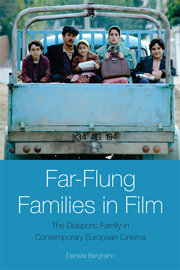Book contents
3 - Family Memories, Family Secrets
Published online by Cambridge University Press: 05 September 2013
Summary
Based on the premise that families are held together by their shared remembering and their complicit forgetting, this chapter investigates the dialectical relationship between those past events that families wish to preserve and those moments that are forgotten and shrouded in silence and which, nevertheless, have a habit of coming out. While the first part of the chapter attends to what I shall call ‘postmemory documentaries’, in which second-generation diasporic filmmakers excavate and reconstruct the migratory histories of their parents, the second part examines fiction films about family secrets and identifies the ‘coming out’ of queer sons and daughters as the most prevalent one. The rationale for including documentaries in a book devoted to the representation of the family in fiction films is that they make the transmission of memories between the generations their chief concern, interweaving footage from old home movies, faded family photos and testimonial interviews with family members. They bring to the fore how generational belonging shapes the diaspora experience in markedly different ways. By interrogating acts of memory and performing their construction, these documentaries make explicit structures that also underpin feature films about diasporic families, but that are seldom narrativised. Moreover, the avowedly personal nature of these documentaries testifies to the autobiographical impetus that, as illustrated in Chapter 1, is deeply entrenched in much of diasporic cinema.
- Type
- Chapter
- Information
- Far-Flung Families in FilmThe Diasporic Family in Contemporary European Cinema, pp. 85 - 119Publisher: Edinburgh University PressPrint publication year: 2013



